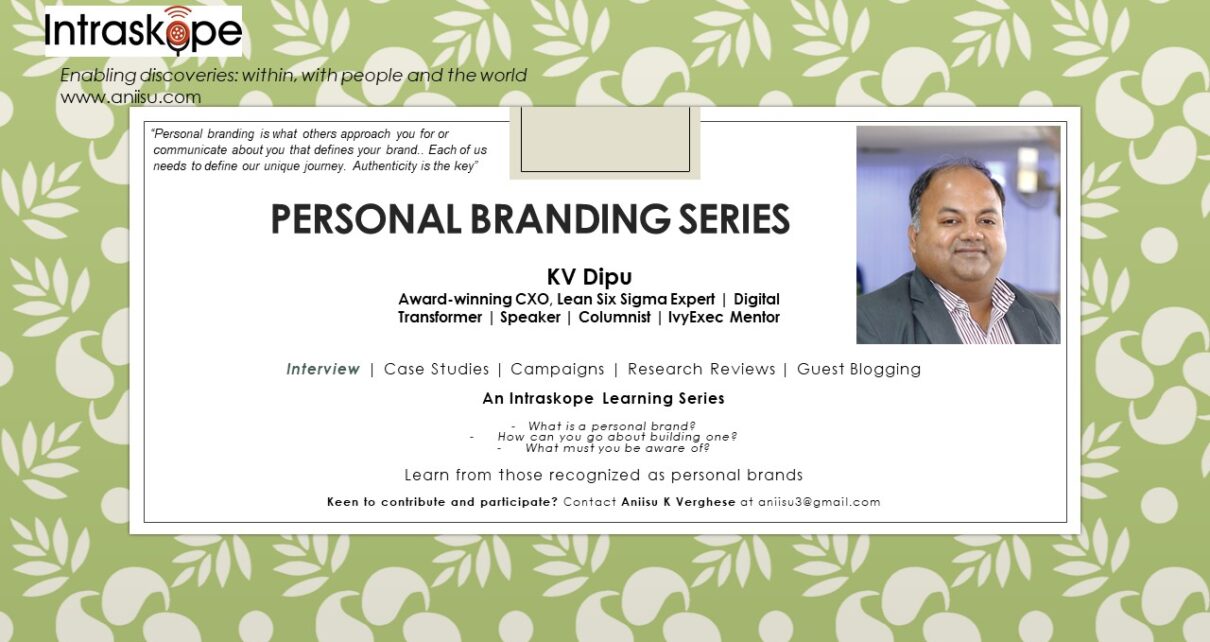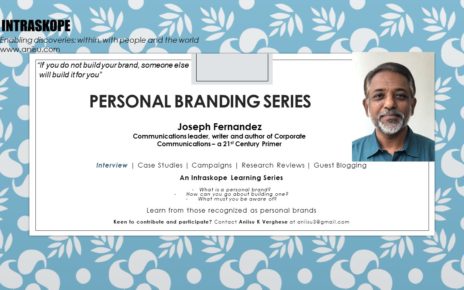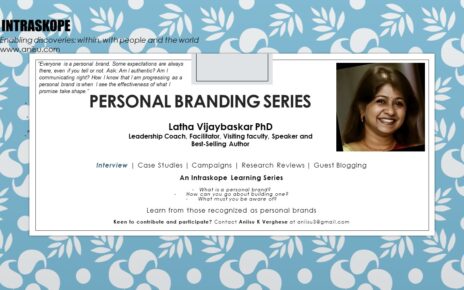Dipu is an award-winning CXO-level executive and currently served as the Head of operations, communities & CX for Asia’s leading general insurance company, Bajaj Allianz. He leads a team of ~1600 people in 170 locations, leveraging fintech / insurtech start-ups globally. Prior to insurance, he worked at GE Capital (financial services + cards) for 20 years, fusing digital transformation & Six Sigma to redesign business models. He is a speaker on innovation at industry forums and a member of the Customer Advisory Board of UiPath. Passionate about people, reading, writing & travel. He is a HBR Advisory Council member, an IvyExec Mentor and the #1 TripAdvisor reviewer with 790,000 readers,
“The first step is to delineate what you stand for. The second step is to master the art of storytelling. How you define your narrative is as important as the narrative itself. The satisfaction you derive when people thank you for the impact you made of them is second to none! It makes all the hard work worthwhile. What you lose out on, at times, is less time for yourself, be it your hobbies or family time”, says Dipu.
In the 23rd edition of Intraskope‘s Personal Branding Series, Dipu discusses the art of differentiation and focus. Bringing his depth of experience and expertise in Six Sigma and other aspects, he shares practical tips that can benefit anyone wanting to make a mark.
Watch the YouTube video interview and read the complete interview below. Look up more such stories on my YouTube channel and on LinkedIn.
Interview
1. What according to you is personal branding?
The definition of personal branding is simple – how do you stand out from the crowd? What goes into the making of this are 3 key elements, amongst others. 1 – Have focus. Most people make the mistake of being everything to everybody. 2 – Be genuine. Everybody is unique and do not be afraid of showcasing your own self to the world. 3. Be consistent in your communication and behavior across media & over time so that what you stand for comes across repeatedly to people.
2. Do you consider yourself a personal brand? If yes, how do you know it?
It is what others approach you for or communicate about you that defines your brand. In my own case, I can talk about 4 aspects. Firstly, a lot of people approach me during their best moments & worst moments. To me, this implies that they see empathy / people connect in me. Secondly, I am invited to several domestic & global writing and speaking events. This indicates an acknowledgement of my expertise in digital transformation and innovation. Thirdly, a lot of people approach me for advice on time management & operating rigor. They say openly that they love my rigorous, six sigma driven approach to work. Fourthly, many consulting and research firms take my point of view for industry reports. I understand from them that they believe I am a thought leader.
3. What does one do to go about building a personal brand?
In essence, promote what you are good at. Elon Musk, for instance, has more followers than 3 of his companies combined on Twitter! Adopt 4 simple steps in sequence – 1. Be authentic. 2. Be clear about your target audience. 3. Produce content which adds value. 4. Be consistent across channels.
4. What are the attributes of a personal brand? And what do people associate your brand with?
The key attribute of a personal brand is the impact you make on people. As I mentioned in my response to the second question, people associate me with empathy & people connect, digital transformation & innovation, six sigma led rigor & thought leadership.
5. Based on your observations and learning who according to you is a personal brand? What characteristics do you admire about them?
If I pick different aspects over time, 3 examples: Mahatma Gandhi – the way he galvanized millions of people without the presence of smartphones and social media was amazing. And he stood consistently for 2 values – truth & non-violence. Virat Kohli – he hasn’t had a cheat day for many years from a fitness point of view. That’s real consistency. Mumbai Dabbawalas – converted an everyday, mundane activity into a global best practice through Six Sigma rigor!
6. What steps did you take to build your brand? How do you know it is working?
2 steps. The first step is to delineate what you stand for. As I mentioned, empathy & people connect, digital transformation & innovation, six sigma led rigor and thought leadership in my case. The second step is to master the art of storytelling. How you define your narrative is as important as the narrative itself!
7. What challenges did you face while building a personal brand? What techniques did you use?
Two challenges. Firstly, shortening attention spans. I tackled that by making my narrative crisp and data-backed. Secondly, the need for agility given unprecedented scenarios such as COVID-19. I resolved this by being highly flexible in my approach even as I stuck to my core.
8. During the process of building your own brand, what did you gain in the process? What did you lose?
The satisfaction you derive when people thank you for the impact you made of them is second to none! It makes all the hard work worthwhile. What you lose out on, at times, is less time for yourself, be it your hobbies or family time.
9. If you had the opportunity to change something about the way you built your personal brand, what would that be?
Two aspects. Firstly, I could have started earlier. Secondly, I could have leveraged more channels.
10. What is your recipe for personal branding success?
Each one has to define his own unique journey. So, from that point of view, authenticity is the key. From my perspective, 2 principles have always inspired me – (a) be the best you can be and (b) help others as much as you can.
11. Who according to you are personal brands whom others can follow and learn from?
It is difficult to define any single brand as an universally applicable one. Each person needs to figure out his strike zone and then pick the top 5 in that area. He / she can then imbibe best practices from them, without losing one’s originality.
12. With COVID19 and other crises what steps can personal brands take?
3 clear areas. Firstly, be agile since the situation is changing by the day. Secondly, be as digital as you can be since touch less user experience is the new frontier. Thirdly, at a time of rapid & unprecedented change, be decisive.
13. What’s your advice for youngsters (Gen Z and others) who want to consider their personal brands?
Two aspects from my experience. Firstly, stop taking life very seriously. Since everything cannot be condensed into a “how to” book, enjoy the moment. Secondly, keep learning. Today, it is not about know-it-all but learn-it-all.
Liked this interview? Please do share your feedback and comments.
Keen to get ahead with your personal brand? Here are some resources:
- Take this course – Personal Branding 101: Unlock Your Potential and Stay Ahead
- Take a FREE assessment on personal branding.
- Refer to the 3C model on Personal Branding
- Sign up for a 60-minute personalized chat on personal branding
- Personal branding for corporate communicators
Missed the earlier episodes? Read the interviews with Muqbil Ahmar, Tinu Cherian Abraham, Joseph Fernandez, Christina Daniels,Karthik Srinivasan,Gautam Ghosh, Alexander Michael Gittens, Mubeen Azeez, Itzik Amiel, Mangal D Karnad, Abhijit Bhaduri, Sandeep K Krishnan PhD, Scott Shirai, Sunil Robert, Latha Vijaybaskar PhD, Abha Maryada Banerjee, Dr. Amit Nagpal, Sukanti Ghosh, Amith Prabhu, Dave Carroll, Prof. Deva Rangarajan and Ramesh Thomas online and share your thoughts.
Keen to join this Series and share your thoughts on Personal Branding? Write to me at aniisu3@gmail.com
Please subscribe to my YouTube Channel and follow me on Medium.
#narrative #authenticity #flexibility #domainknowledge #customerfocus #personalbranding #lifeskills #clarity #commitment #consistency #addvalue #buildexpertise #reinventyourself #focus #branding #drive #communications #fulfilment #courage #confidence



